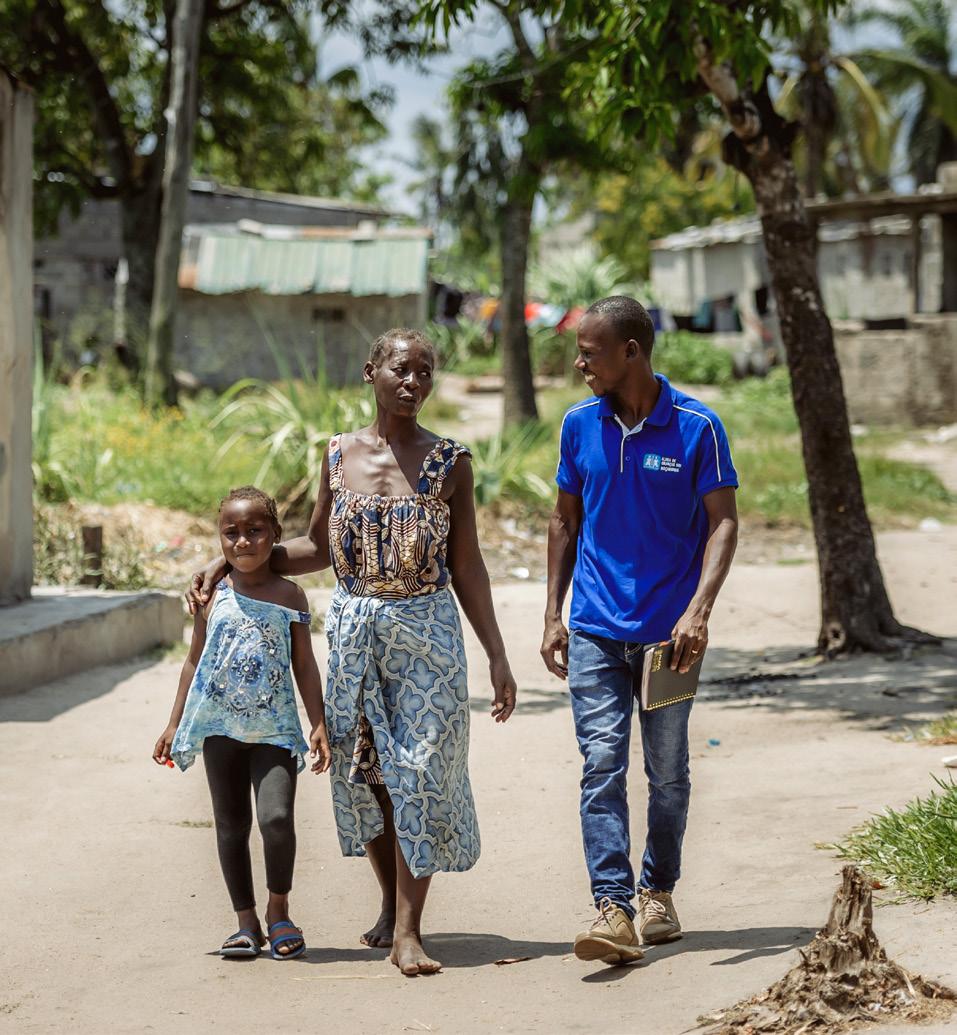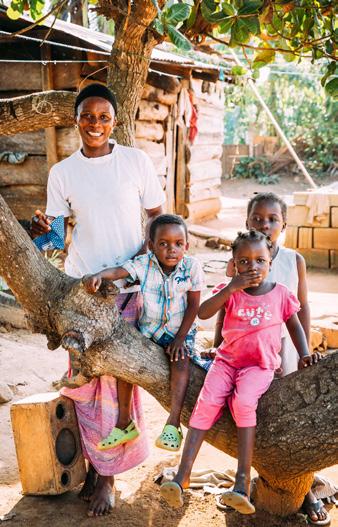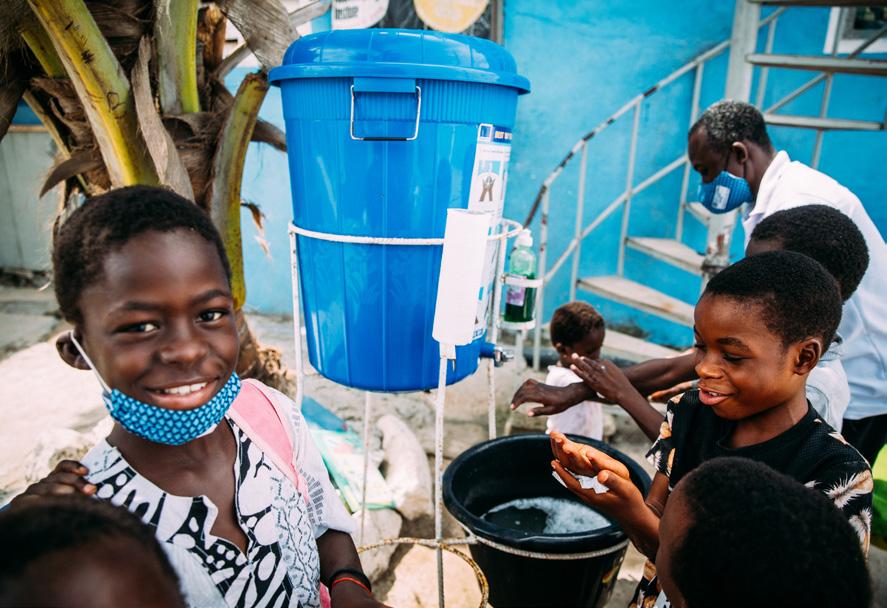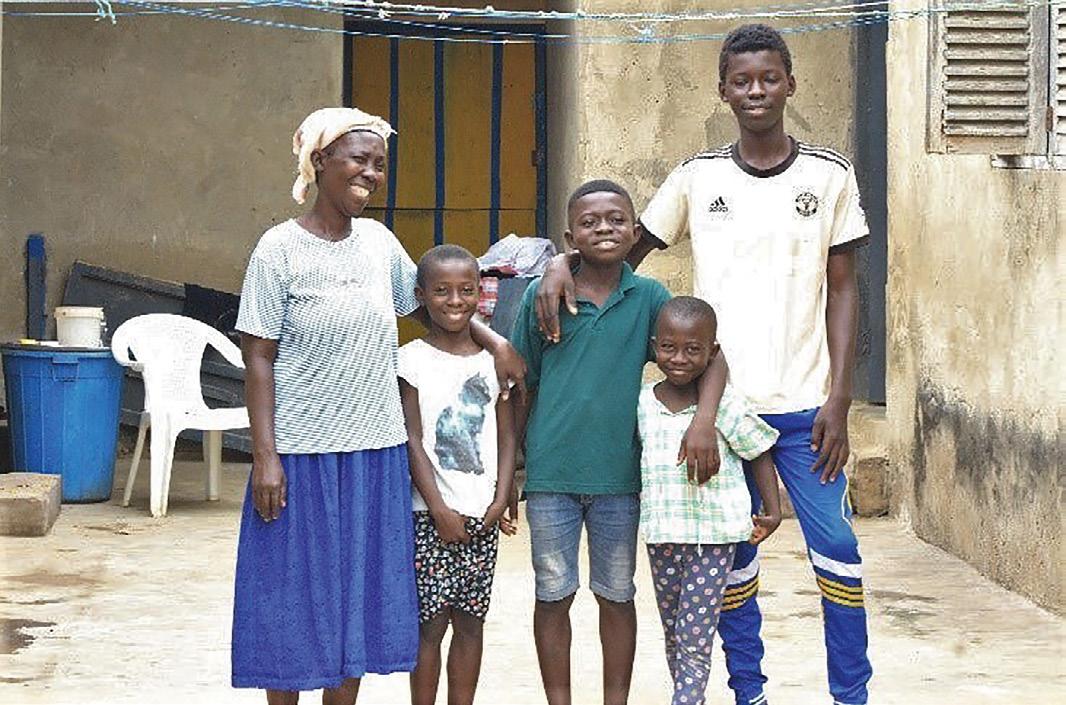
9 minute read
Family Strengthening programme Asiakwa
THE FAMILY-STRENGTHENING PROGRAMME ASIAKWA
Ghana
Advertisement
DURATION: 2019 – 2023 TOTAL BUDGET: €132,248 – spent in 2020 €135,629
Project description
The goal of this family-strengthening programme (FSP) is to strengthen 300 families at full capacity so they can continue to care for their 1,000 children. The key activities include promoting children’s rights by raising awareness and empower them to advocate for their rights as a child, at a family and community level, and providing support for activities that generate income for caregivers and young people by setting up Village Savings and Loan Associations. The programme facilitates: • Access to education for children; • Access to WASH by empowering local structures to improve the water supply, sanitation and hygiene; • The empowerment of young people through basic life skills training including entrepreneurial and employability skills, technical training and the start up of income generating activities have been the main areas of intervention and focus.
Target group
• Children aged 0-18 years at risk of losing parental care, and families. Girls receive special attention as they are more vulnerable to being kept out of school and to domestic violence and abuse. • Disadvantaged young people aged 18-25 years, for example young people who are unemployed or underemployed.
Sustainable Development Goals Main activities and results
• 807 vulnerable children from 243 families are at this point admitted to the family-strengthening programme and are receiving various forms of support. • 150 caregivers received training and counselling in good parenting in the areas of home management, nutrition, positive discipline, child rights and obligations and the various conventions of child rights and protection through training courses and workshops. • 84 caregivers have been supported with grants through the Village Savings and
Loan Associations as well as individual grants. • 150 caregivers acquired knowledge and skills in basic financial and business management on how to increase and maintain a customer base, basic bookkeeping and savings. • 87 young people were admitted to the FS programme bringing the total number of young people in the programme to 103. • 90 young people were trained in core life skills topics such as effective communication, decision making and the basic business cycle, identifying opportunities, planning and self-esteem, all gearing towards the self-confidence and self-resilience of young people and helping them stay relevant on the job market. • 21 young people were supported with start-up business capital and are now earning a regular income to support themselves and their families.
• 30 young people were trained in collaboration with the Ministry of Agriculture and supported to undertake modern and sustainable vegetable production. • In promoting child rights and protection, the programme partnered with other stakeholders and duty bearers such as the traditional authorities, the police, the
Domestic Violence and Victims Support
Unit (DOVVSU), and the Department of
Social Welfare (DSW) and formed three child protection committees in the community, which is resulting in increased compliance with child rights. • The programme built the capacities of 35 stakeholders comprising community-based organisations, teachers, youth groups and opinion leaders through community awareness and workshops.
This is aimed at increasing the knowledge and skills of community members on issues of child rights and protection and to enable them to take initiatives to protect children in the communities and schools. • The programme partnered with the
Municipal Directorate of Education to equip 80 caregivers to acquire knowledge of the government intervention programmes (virtual learning guidelines) to mitigate the impact of the Covid-19 pandemic on the children’s education as a result of the closure of schools. The programme supported 63 children with marker boards and other educational materials for them to catch up with their lessons carried out via different media platforms such as national television. • WASH facilities were renovated in one of the schools in Kukurantumi. The girls are now comfortable and confident when they come to school. • 20 carers and 61 children were registered under the National Health Insurance
Scheme to enable them to access quality healthcare when the need arises.

Impact
The vicious circle of separation and abandonment has been broken, as families have been strengthened in terms of their basic needs and amenities, income, parenting and care. Children and young people know their rights and have access to education and training, and therefore have a genuine chance of taking the step towards self-reliance and a bright future. The COVID-19 pandemic delayed the implementation of programmes in the community mainly because of a partial lockdown. The government banned gatherings of all kinds, including workshops, and closed all schools, which forced children and young people to stay home for ten months. Families became increasingly impoverished as they could not generate income by selling (farm) products, while they had to purchase sanitation products and face masks, and feed their children, who were now not receiving a daily meal at school.
Children in the area continue to face a myriad of developmental challenges in relation to care and protection. Parents seek paid

Covid-19 challenges and activities
employment in the cities and abandon their children with their aged grandparents. Adherence to the UN Convention of the Rights of the Child therefore remains a challenge.
• 2,000 re-usable face masks and hand sanitisers were distributed to 1,000 participants. • 1,300 children and young people as well as 350 caregivers in alternative care and family strengthening received education about Covid-19 on prevention and management and how to combat stigmatisation resulting from the pandemic. • 60 children and young people from upper primary school to junior high school
received general counselling to mitigate any anxiety and stabilise them as school closures could cause them emotional uncertainty. • Over 100 families were supported with grants through a Covid-19 Solidarity Fund project to revive and or expand their businesses. • 28 children from 8 families were able to access remote learning as the project supported them with 8 television sets while their caregivers received counselling on how to assist with remote learning. • 26 families had access to basic needs and supplies to cater for their children through the support of a 3-month cash transfer.

Faustina’s journey towards her children’s bright future
Faustina, 59, is an entrepreneur and a single mother, and she has set her mind on preparing her six children for a happy and successful life. She sells fante kenkey, a kneaded maize meal dough cooked in dried plantain leaves, and served with different sauces. It is a delicacy and one of Ghana’s most consumed meals. With her earnings, Faustina has changed the narrative of her children’s future from bleak to hopeful. She has also provided a stable home in which they can feel secure. The family lives in Kukurantumi community in Ghana’s Eastern region. Faustina was a battered woman just a few years ago. Her husband often physically abused her when she asked him to provide for the family. Dejected, Faustina thought to engage in petty trading at least to feed her children, if nothing else. That is when she started selling kenkey. The income was meagre, and sometimes she had to beg to feed her family. “I could not afford to pay the hospital bill when I gave birth to my lastborn child, and my husband refused to pay,” recalls Faustina. “So I hid and escaped from the hospital with my baby to avoid paying it.” The mother of six describes herself as a happy person by nature, but hardship had wiped the smile off her face and left her a stressed unhappy person. She had developed chronic headaches and stomach ulcers as a result. When Faustina could no longer tolerate her husband’s abuse, she left and took the children with her. They went to live in an incomplete single-roomed ramshackle with no electricity, water, or a toilet. For lack of educational materials, her children dropped out of school and joined her in selling kenkey.
Family strengthening care
The opinion leaders from the Kukurantumi community identified the vulnerable family and linked Faustina to the SOS Children’s Villages family strengthening programme. This was an opportunity for her to receive critical support to tackle problems robbing her of the ability to provide for her children. Through the Village Savings and Loan Association Faustina gained financial knowledge, and the SOS team further empowered her with entrepreneurial and parenting skills. At the Village Savings and Loan Association Faustina accessed funds to purchase raw materials for her kenkey business and for expansion. The children happily returned to class upon receiving uniforms, stationery and other educational materials they needed to learn. “SOS family strengthening has helped us think positively about ourselves and the future,” says 16-year-old Kwaku. “Before, thoughts of how to survive dominated our minds. It is great to see my mother smiling again and working hard to expand her business; she is taking good care of us. Our self-esteem and confidence had really suffered but we are now motivated to improve it. We are in a new chapter of our lives,” he says. Faustina and her children now live in a decent accommodation. She has registered them including herself under the National Health Insurance Scheme, to access quality health care services. Under this scheme, she was able to seek treatment for her headaches and ulcers. “We are now a real family because we are able to support and inspire one another,” observes Faustina. I was heartbroken when my children depended on me and yet I could not provide for them. Thankfully, that is in the past,” she says.
Covid-19 support










